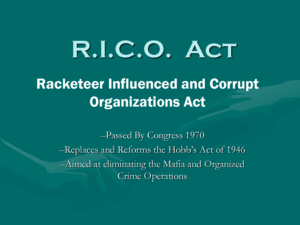 Racketeering or RICO is the Federal crime of conspiring to organize to commit crimes, especially on an on-going basis as part of an organized crime operation. In the 1980’s, the U.S. Congress enacted the Racketeer Influenced and Corrupt Organizations Act (RICO), 18 U.S.C., Section 1961, ostensibly to curtail the criminal activities of the Mafia. In the 40 years since RICO was enacted, the application of the law has extended far beyond the activities of loan sharks, labor extortionists, gambling syndicates, prostitution rings, and traditional organized crime activity. RICO laws have been used against legitimate businesses, including banks, accounting firms, labor unions, law firms, securities brokerages, and social action organizations.
Racketeering or RICO is the Federal crime of conspiring to organize to commit crimes, especially on an on-going basis as part of an organized crime operation. In the 1980’s, the U.S. Congress enacted the Racketeer Influenced and Corrupt Organizations Act (RICO), 18 U.S.C., Section 1961, ostensibly to curtail the criminal activities of the Mafia. In the 40 years since RICO was enacted, the application of the law has extended far beyond the activities of loan sharks, labor extortionists, gambling syndicates, prostitution rings, and traditional organized crime activity. RICO laws have been used against legitimate businesses, including banks, accounting firms, labor unions, law firms, securities brokerages, and social action organizations.
Follow Charles